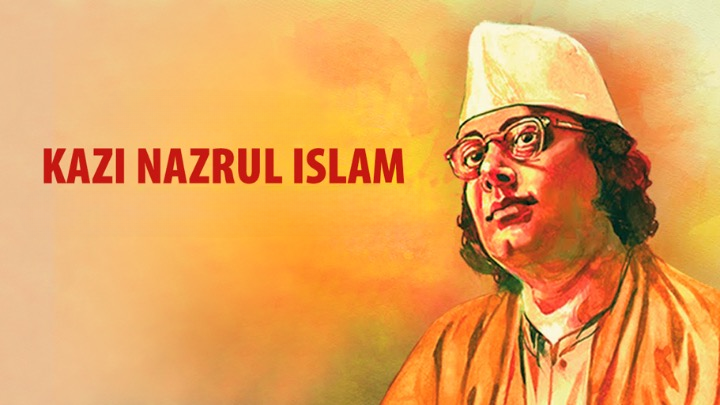Kazi Nazrul Islam

- 25 May 2024
Why is it in the News?
One hundred and twenty-five years ago on May 25, 2024, a ‘rebel poet’ was born in undivided Bengal who would go on to create about 4,000 songs and several stories to remind his warring and impoverished country folks of the power of humanity to tide over hunger, poverty and disintegration of society.
Who was Kazi Nazrul Islam?
- Kazi Nazrul Islam (1899-1976) was a Bengali poet, writer, and musician whose oeuvre, Nazrulgeeti (Songs of Nazrul), constitutes a musical genre that is perhaps second in popularity to only Rabindrasangeet, the compositions of Rabindranath Tagore.
- He enjoys iconic status in West Bengal, Bangladesh, and the Bengali diaspora around the world, and is revered as the National poet of Bangladesh.
- Nazrul is known as the Bidrohi Kobi (Rebel Poet) because most of the more than 4,000 songs that he wrote and composed are songs of protest and revolution, which inspired the freedom fighters of Bengal in their struggle against colonialism and imperialism.
- In 1923, the British arrested Nazrul because of the strongly anti-British content of a magazine that he founded and edited.
- His first poem was published when he was still in Karachi, in the Bangiya Mussalman Sahitya Patrika.
- Some of the poems he had composed and contributed in Moslem Bharat included Shatil Arab, Moharram, Korbani, Fatiha, Doazdaham, Badal Prater Sharab, and Kheya Parer Tarani, amongst others.
- The political conditions in which Nazrul Islam eventually began his career as a writer were ones conditioned by extreme tensions and conflict including the Jallianwala Bagh massacre and launch of the Non-Cooperation Movement following the special session of the Indian National Congress, and especially in the context of the “divide and rule” policy which was adopted by the British.
- Several issues that the populace of the subcontinent had to deal with included economic backwardness, racial prejudices, and social inequality.
- In such circumstances, he joined a Bengali newspaper called Naba-Yug (New Era).
- His writings were later compiled and published as a book Yugabani (Message of the Age) which was immediately banned by the British government.
- Apart from writing and working for several other newspapers of the times, including Sevak, he had also started his own political weekly in 1922, named, Dhumketu (The Comet).
- The paper explicitly voiced their opinions against the British government and played an important role in steering the rebellious attitude and voices of the populace.
- As a result, Nazrul was charged with charges of sedition and he was sentenced to 1 year of rigorous imprisonment in 1923.
- On this occasion, Rabindranath Tagore had also dedicated a newly composed dance-drama Basanti to Nazrul, which was performed in Calcutta.
- Nazrul Islam was a prolific poet and composed several poems on various themes including themes of social messages, and resistance against the colonial government.
- He had effectively used his poems as a literary conduit to voice his opinions against British colonial rule.
- The highest point of his career as a poet was when he composed the poem Bidrohi (The Rebel).
- The poem was highly appreciated and established him as a well-respected poet.
- The poem was characterized by a revolutionary spirit and rife with heroic sentiments.
- It portrayed a revolutionary who had called upon the marginalized sections of the society to rise up and face the British despots.
- The compositions of Kazi Nazrul Islam in the form of songs, poems, and other forms of literature formed a very strong and powerful weapon against British colonial rule.
- The revolutionary themes which were explicit in his writings played an important role during the freedom movement.
- He consistently raised his voice against communalism, imperialism, fundamentalism and exploitation.
- His literary legacy is remembered and acknowledged to this date.
- He had earned the respect of not only his contemporaries but also of the later generations.
- His contributions thus are not limited to the efflorescence of Bengali literature but also extended to the cause of freedom during the Indian Independence Movement.
